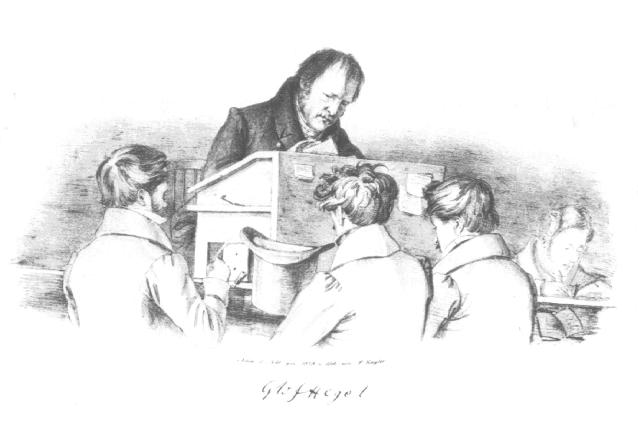"Subjectivity" is a really misused word in general. I meant something like "self," but even that is not what is at stake in the master-slave dialectic. Nothing like it even appears or presents itself there throughout the whole passage. What presents itself is, as she said, the dialectic, but also and more specifically, self-consciousness. And what gets staked--that is, either lost by the master-slave relationship or relieved/superseded by it-- is life. Hegel says:
Die Darstellung seiner aber als der reinen Abstraktion des Selbstbewusstseins besteht darin, sich als reine Negation seiner gegenständlichen Weise zu zeigen, oder es zu zeigen, an kein bestimmtes Dasein geknüpft, an die allgemeine Einzelnheit des Daseins überhaupt nicht, nicht an das Leben geknüpft zu sein. Diese Darstellung ist das gedoppelte Tun; Tun des Andern, und Tun durch sich selbst. Insofern es Tun des Andern ist, geht also jeder auf den Tod des Andern. Darin aber ist auch das zweite, das Tun durch sich selbst, vorhanden; denn jenes schliesst das Daransetzen des eignen Lebens in sich.
[The presentation of itself, however, as the pure abstraction of self-consciousness consists in showing itself as the pure negation of its objective mode, or in showing that it is not attached to any specific existence, not the the individuality common to existence as such, that it is not attached to life. This presentation is a twofold action: action on the part of the other, and action on its own part. In so far as it is the action of the other, each seeks the death of the other. But in doing so, the second kind of action, action on its own part, is also involved; for the fomrer involves the staking of its own life.]
The master-slave relationship is about dialectic because it it the form of this relationship that gets constituted and is proper to the appearance of self-consciousness (its phenomenality): this is why Hegel focuses on what is shown or presented in the confrontation: or rather this is why he says the (twofold) confrontation is itself a Darstellung (diese Darstellung ist das gedoppelte Tun). The only thing that perhaps functions like (though still does not appear similar to) a self or a subjectivity that makes its appearance here is life, and this is the reason why I wanted to say "self" and said "subjectivity"--and, I'm thinking, why this mistake is made more generally in talking about this famous passage in Hegel.
Life in Hegel is an interesting thing: it is thought about constantly in his earlier writings in a similar way to how he thinks, later on, about Geist. Life in the Phenomenology, however, seems a little more bare: it becomes something like bare life, the functioning of Spirit at a natural level. It is what must be superseded, essentially, because it is the most basic thing that challenges self-consciousness in the other: that is, his bare existence as foreign to self-consciousness, to consciousness' being-for-itself. But notice that this bare existence is not itself something foreign to self-consciousness in general. It itself is an appearance or a mode of manifestation of a self-consciousness: in other words, life is not something with some significance outside of remaining just another way that self-consciousness appears here to a self-consciousness (whether it be one's own or the other's). What I'm getting at is that life just another form of the dialectic operating as a form of or within (for lask of better words) self-consciousness, and we mistake it for something else, something more vague, if we think of it apart from its dialectical structure--that is, by what we normally might mean by it.
Thus, though her ultimate reason might be more Derridian, my professor was absolutely right: that is, she was right not even because the dialectic, as Derrida shows in "From Restricted to General Economy," is what gets arbitrarily (and yet also, for other reasons, necessarily) preserved by Hegel throughout his rendering of the master-slave relationship--in other words, not because the dialectic is what is at stake for Hegel--but also because what is being talked about in it is only the dialectic, not something external to it or itself other than it that we designate by life or self-sufficiency. This is the hard part about thinking about Hegel: getting outside of his own verbiage to explain him--as I tried to do--inevitably makes one betray the phenomenon (in Hegel's sense, the self-showing of Spirit) that one seeks to convey: it takes one also outside the form of spirit (in this case, self-consciousness) that one is discussing or bringing to language.
So, in the master-slave dialectic, what is at stake is the ability of the dialectic to appear or show itself as a Darstellung, and in doing so, risk something about that Darstellung that structures and is structured by this ability: life. In other words, the self-sufficiency of self-consciousness is what is challenged by the life of the other, which must leads one to stake one's own life (or rather, present one's life) to him in mortal combat. This is the better way to put it. Because the other exists, because their phenomenality appears (a redundant way to put this, but I'm just trying to be clear), I am threatened as anything that must be more than just living, more than bare life--namely, self-consciousness. Thus, I must present myself against them in a fight.


